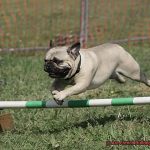Are French Bulldogs protective of children?
In the vast realm of dog ownership, where tails wag and paws patter, certain breeds stand out with their endearing personalities and irresistible charm.
Enter the French Bulldog, a pint-sized powerhouse that has captured the hearts of many with its adorable appearance and lovable nature.
But behind those expressive eyes lies a burning question: are French Bulldogs truly protective of children?
In this captivating blog post, we embark on an exciting exploration into the world of French Bulldogs to uncover whether they possess an innate instinct to safeguard the little ones in our lives. As fellow parents who prioritize safety above all else, unraveling the truth about these furry companions’ protective tendencies is paramount.
So whether you’re contemplating adding a French Bulldog to your family or simply intrigued by their unique traits, grab a cuppa, kick back, and prepare for an enlightening journey ahead. By the time we reach our destination, you’ll have gained valuable insights into whether these delightful canines make exceptional guardians for your precious bundles of joy.
Without further ado, let’s plunge headfirst into the depths of understanding French Bulldogs’ protective prowess.
Examining the Level of Protection in French Bulldogs Towards Children
Contents
- 1 Examining the Level of Protection in French Bulldogs Towards Children
- 2 Understanding the Temperament of French Bulldogs
- 3 Socializing and Training French Bulldogs for Protection
- 4 Physical Protection from French Bulldogs
- 5 Influencing Factors on a French Bulldog’s Protective Behavior
- 6 Supervising Interactions Between Dogs and Children
- 7 Education is Key: Teaching Kids How to Respect Dogs
- 8 Conclusion
French Bulldogs are renowned for their affectionate nature and make excellent companions for families with children. While they may not possess the size or strength of larger breeds typically associated with protection, French Bulldogs can still offer a level of safeguarding. In this blog post, we will explore the protective instincts displayed by French Bulldogs towards children, highlighting their gentle nature and the importance of proper socialization and training.
A Gentle Guardian:
French Bulldogs are known for their patient and gentle demeanor, making them ideal companions for young children. Their affectionate nature allows them to form strong bonds with children in the family, creating a sense of security and trust.
Protective Instincts:
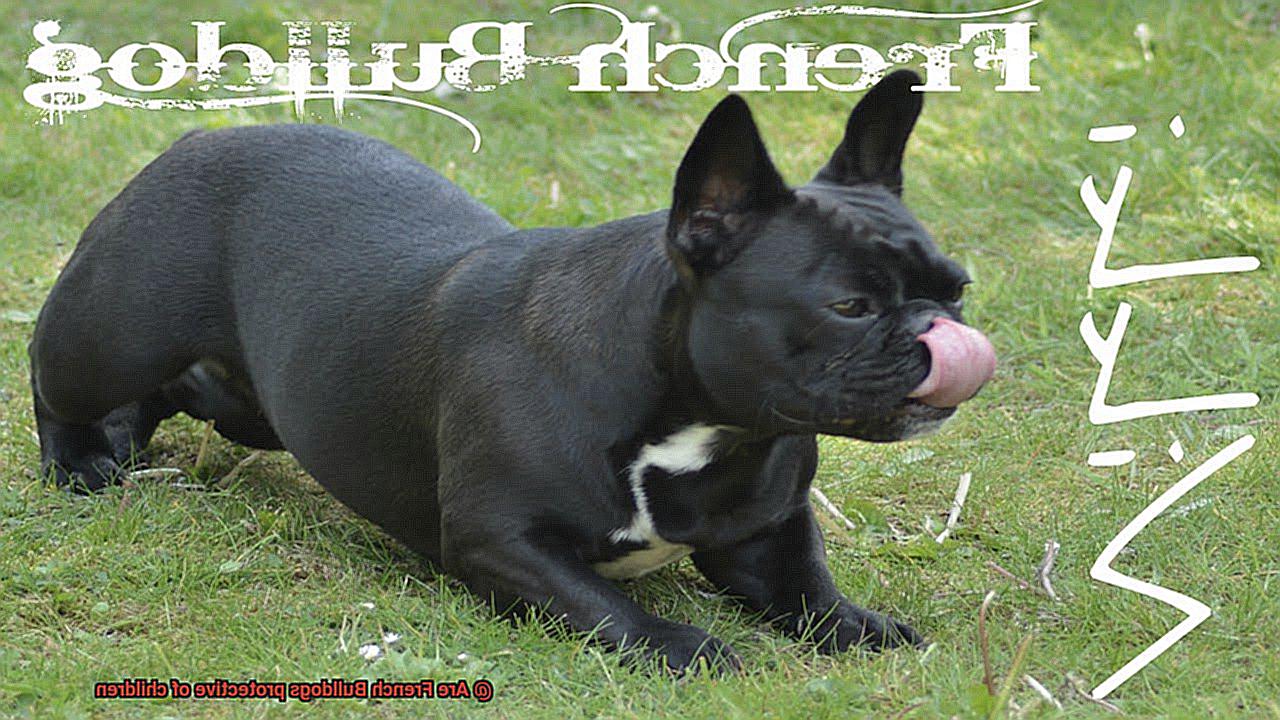
While French Bulldogs may not exhibit the same level of protective behavior as larger breeds, they can still demonstrate a sense of vigilance towards potential threats. They have an innate ability to recognize when something is amiss, and may alert their family by barking or positioning themselves between the child and perceived danger.
The Importance of Socialization:
Proper socialization from an early age is crucial in shaping a French Bulldog’s behavior towards children. By introducing them to various environments, people, and experiences, we can help them become confident and comfortable around kids. This lays the foundation for a positive and protective relationship.
Training for Appropriate Behavior:
Training is essential in ensuring that French Bulldogs understand how to interact appropriately with children. Teaching them basic commands such as “sit,” “stay,” and “leave it” can provide owners with better control over their dog’s behavior around kids. It also establishes clear boundaries and reinforces positive interactions.
Supervision is Key:
Even though French Bulldogs are generally good with children, it is important to supervise their interactions. Accidents can happen, especially if a child unintentionally provokes or mishandles the dog. Supervision ensures the safety of both the child and the dog, preventing any potential misunderstandings or mishaps.
Understanding the Temperament of French Bulldogs
French Bulldogs, also known as “Frenchies,” are small-sized dogs with a big personality. If you’re a proud owner of one of these adorable pooches and have little ones running around, you may be wondering if they possess the protective instincts needed to keep your children safe. Well, fear not. In this blog post, we’ll explore the temperament of French Bulldogs and shed light on their unique traits that make them gentle guardians for children.
Affectionate, Friendly, and Sociable
French Bulldogs are renowned for their affectionate nature. They form strong bonds with their human family members, including children. These dogs thrive on human companionship and yearn to be part of the family. They’ll seek attention and happily get involved in everyday activities, making them ideal companions for children.
Gentle and Patient
One of the key traits of French Bulldogs is their gentle and patient nature. They’re known for their tolerance and acceptance of children’s antics. Whether it’s endless hugs, playful tugs on their ears, or dressing them up in silly costumes, Frenchies take it all in stride. They seldom display aggression or a propensity to bite, which is crucial when considering them as family pets.
Playful and Clownish
French Bulldogs are natural entertainers. Their playful and clownish behavior can bring a smile to anyone’s face, especially children. Whether it’s chasing after a ball or performing silly tricks, Frenchies know how to keep the little ones entertained for hours on end.
Loyal and Alert
While French Bulldogs may not possess the same level of protective instincts as some other breeds, they do exhibit a certain level of loyalty towards their loved ones. They’ll often alert their owners to any potential dangers or strangers approaching the home, providing an added sense of security.
Proper Socialization is Key
It’s important to note that each French Bulldog has its own unique personality. Factors such as genetics, upbringing, and socialization play a significant role in shaping their temperament and behavior.
Therefore, it’s crucial to ensure proper socialization from an early age. Exposing them to various environments, people, and experiences helps them develop into well-rounded individuals who are comfortable around children.
Supervision and Respectful Interactions
When it comes to interactions between young children and French Bulldogs, supervision is vital. Accidents can happen if boundaries are not respected or if the dog feels threatened or overwhelmed. Teaching children how to approach and interact with dogs respectfully is essential for fostering a safe and harmonious relationship between them.
Socializing and Training French Bulldogs for Protection
In this comprehensive guide, we will explore the key steps and techniques to socialize and train your French Bulldog for protection. Whether you’re a new Frenchie owner or looking to enhance your dog’s protective instincts, this guide is here to help.
Step 1: Socialization for Positive Behaviors
- Introduce your Frenchie to children early on to establish positive associations.
- Supervise interactions between your Frenchie and children, ensuring safety and positive experiences.
- Teach children how to properly handle and interact with the dog, promoting respect and gentle behavior.
Step 2: Basic Obedience Training
- Train your Frenchie in basic obedience commands such as sit, stay, and come.
- These commands establish control in various situations and lay the foundation for further training.
Step 3: Advanced Training Techniques
- Consider working with a professional dog trainer who specializes in protection training.
- They can teach your Frenchie specific protective behaviors like guarding designated areas or alerting you to potential dangers.
Step 4: Recognize Limitations
- While French Bulldogs may not have the physical capabilities of larger guard dog breeds, their alertness and loyalty can still make them effective protectors.
- Focus on their natural instincts and enhance their ability to deter potential threats or provide a sense of security for children.

Step 5: Consistency, Reinforcement, and Patience
- Consistency is key when training your Frenchie for protection.
- Use positive reinforcement techniques such as treats and praise to encourage desired behaviors.
- Be patient and understand that every Frenchie is unique, so tailor the training approach accordingly.
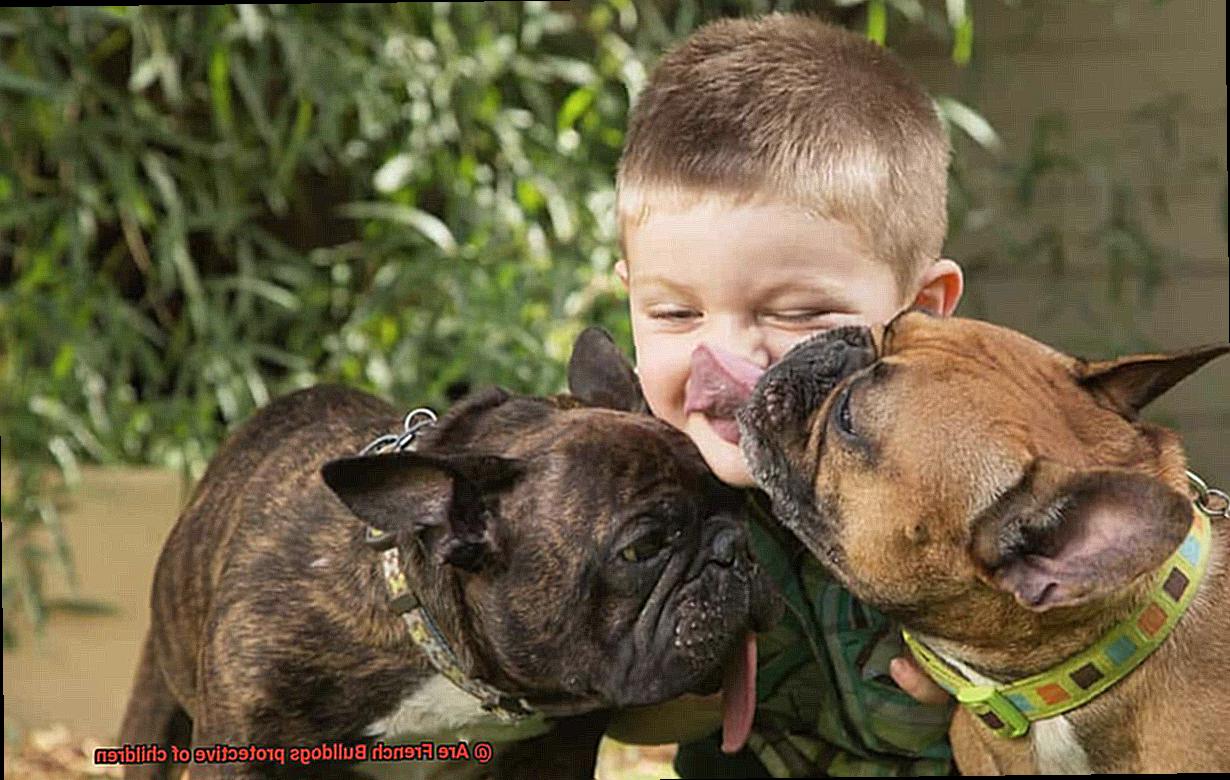
With proper socialization and training, your French Bulldog can become a loving companion and a reliable protector for your children. Remember to create a balanced environment for your Frenchie, providing regular exercise, mental stimulation, and a secure home. By following these steps and investing time in their training, you’ll be well on your way to nurturing a protective bond between your Frenchie and your family.
Physical Protection from French Bulldogs
Despite their small size, French Bulldogs possess certain physical attributes that make them excellent guardians. In this article, we will explore how these pint-sized protectors can keep your little ones safe and sound.
The Power of Deterrence:
French Bulldogs may not have the size of a giant guard dog, but their strong build and muscular body make them surprisingly formidable. Their presence alone can make potential intruders think twice before approaching your home or getting too close to your child. It’s like having a miniature bodyguard by your side.
The Intimidating Appearance:
Don’t let those adorable wrinkles and big, expressive eyes fool you. French Bulldogs have a distinctive appearance that can send chills down the spine of potential threats. Their compact body and large head give them an imposing look, even though they may be as cuddly as teddy bears. This unique appearance serves as a visual deterrent and ensures that your child stands out as a well-protected treasure.
Ears Like Radar:
French Bulldogs have an amazing sense of hearing that rivals any superhero’s superpower. They can detect unusual sounds or movements from miles away (okay, maybe not miles, but you get the idea.). With their innate alertness and attentiveness, these furry guardians will bark or growl at the slightest sign of trouble around your children. It’s like having a built-in security system that never takes a break.
Training for Ultimate Protection:
While French Bulldogs have natural protective instincts, proper training is essential to harness their full potential. Socialize your Frenchie from an early age, exposing them to different environments, people, and situations. This will help them differentiate between genuine threats and harmless situations, ensuring their protective response is accurate and appropriate.
Influencing Factors on a French Bulldog’s Protective Behavior
French Bulldogs, known for their loyalty and affection, have an innate instinct to protect their loved ones. This protective behavior extends to children in their family. In this article, we will explore the various factors that influence a French Bulldog’s protective behavior towards children. Understanding these factors will help owners foster a strong bond between their Frenchie and their little ones, ensuring a harmonious and safe environment.
Temperament and Personality:
- French Bulldogs display a wide range of temperaments, from highly protective to more laid-back.
- Assess your Frenchie’s individual personality to gauge their potential for being protective towards children.
- Respect and work with their natural inclinations.
Early Socialization:
- Expose your Frenchie to children from a young age in a positive and controlled manner.
- Encourage pleasant interactions with children to foster a protective instinct.
- Negative encounters or lack of exposure to children can hinder the development of protective behaviors.
Obedience Training and Socialization:
- Proper training establishes boundaries and teaches your Frenchie how to respond appropriately to various situations involving children.
- Focus on reinforcing positive behaviors and discouraging any aggressive tendencies.
- Enroll in obedience classes or consult professional trainers if needed.
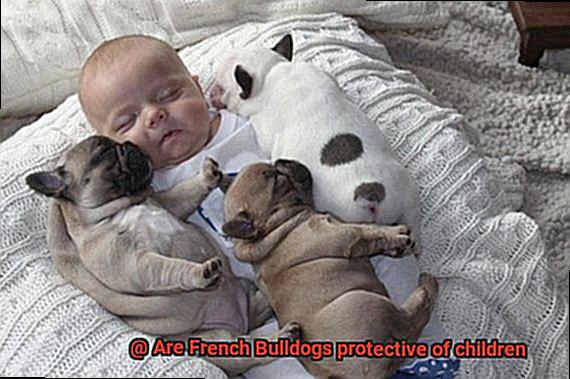
Relationship Building:
- Strengthen the bond between your Frenchie and your children through regular interaction, playtime, and positive reinforcement.
- Create opportunities for shared experiences that build trust and camaraderie.
- A strong bond enhances the dog’s sense of responsibility towards protecting the children.
Environmental Factors:
- Create a calm and nurturing environment for your Frenchie to promote feelings of security.
- High-stress environments or lack of proper care can dampen protective behaviors.
- Ensure your Frenchie feels loved, safe, and well-cared for at all times.
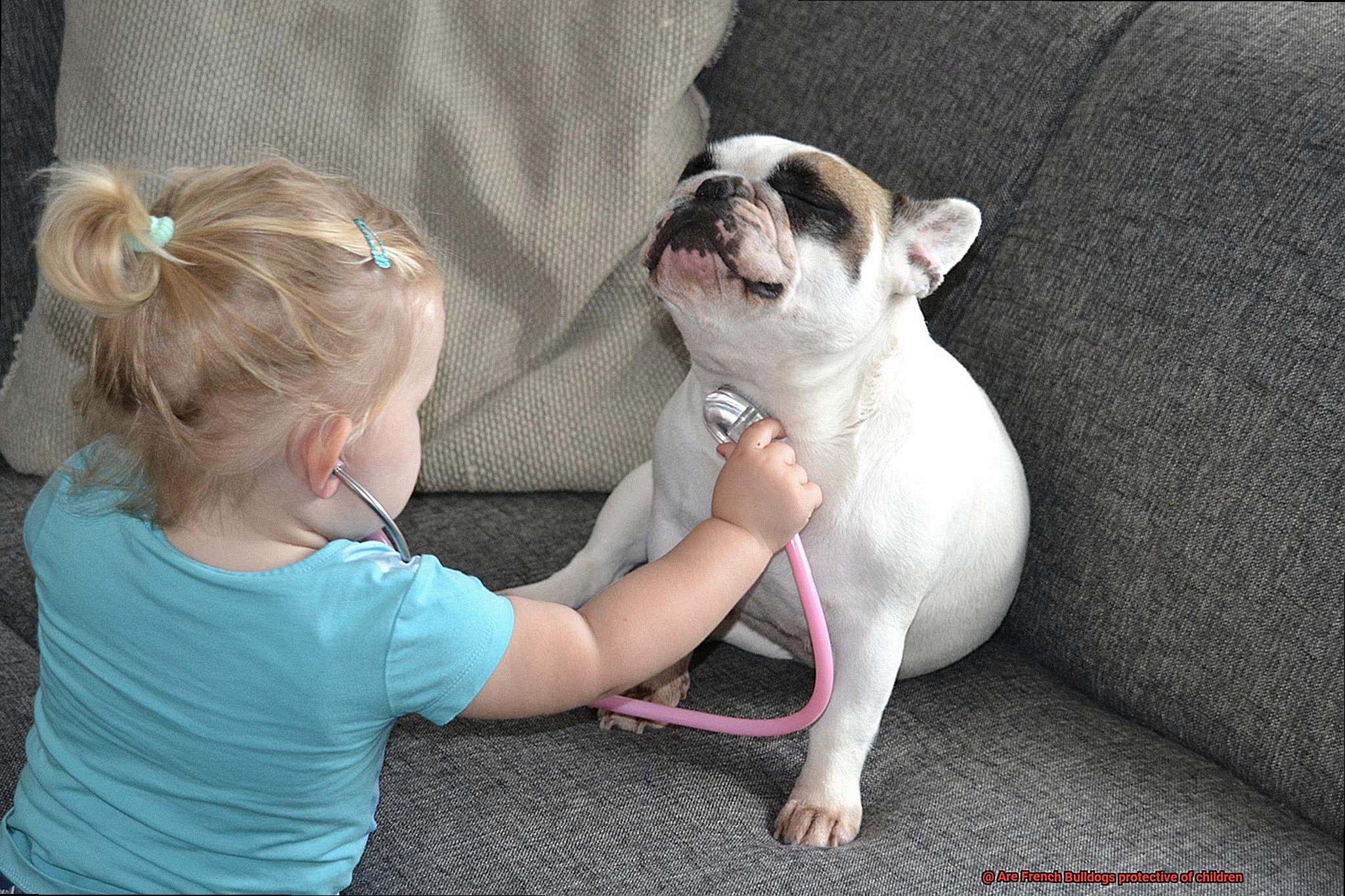
Genetic Predispositions:
- Consider the breed’s general tendencies when assessing your Frenchie’s potential for protective behavior.
- Certain traits and tendencies may be passed down through generations, influencing their inclination to protect their family, including children.
Supervising Interactions Between Dogs and Children
French Bulldogs are known for their gentle and affectionate nature, making them excellent companions for children. However, it is crucial to remember that they are still dogs and require proper supervision when interacting with children. In this article, we will explore the importance of supervising these interactions and provide practical tips for French Bulldog owners.
Teaching Appropriate Behavior:
- Teach children how to approach and interact with French Bulldogs respectfully.
- Train your Frenchie to respond positively and calmly to children’s actions.
- Establish clear boundaries for both the dog and the child to prevent any potential negative reactions.
Recognizing Signs of Stress:
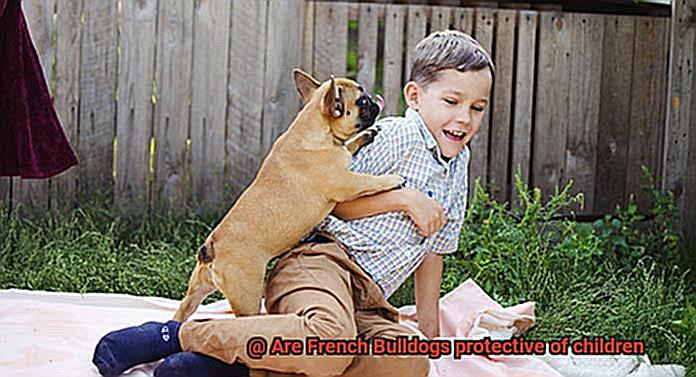
- Watch for signs of stress or anxiety in your French Bulldog, such as growling or attempting to move away from the child.
- Intervene promptly if you notice any signs of discomfort or stress, redirecting the child’s behavior appropriately.
Controlled Introductions:
- Gradually introduce your French Bulldog to a new child in a controlled environment.
- This allows both the dog and the child to become familiar with each other’s presence and build a positive relationship.
Proper Handling:
- Teach children not to disturb the dog while eating or sleeping, as this can lead to defensive behaviors.
- Supervise interactions and guide children in understanding how to handle the French Bulldog gently and safely.
The Role of Adults:
- Ensure that interactions between French Bulldogs and children are supervised by an adult who understands dog behavior.
- Adults can quickly recognize signs of discomfort or stress and address them before any negative incidents occur.
Remember, even the most well-trained French Bulldog can have unpredictable reactions. Always err on the side of caution and prioritize supervising interactions between dogs and children at all times.
Education is Key: Teaching Kids How to Respect Dogs
French Bulldogs are known for their adorable squishy faces and playful personalities, making them a popular choice for families with children. However, it is crucial to educate kids on how to respect these lovable pooches to ensure a safe and harmonious relationship between your little ones and your furry friend.
Dogs Have Feelings Too:
Just like humans, French Bulldogs have emotions, and it’s important for children to understand this. Explain to them that dogs can feel happy, sad, scared, or even stressed. Encourage empathy by highlighting that dogs deserve kindness and respect.
The Golden Rule: Always Ask for Permission:
Teach your kids the importance of asking for permission before approaching or petting any dog, regardless of its breed. This simple gesture shows respect for the dog’s personal space and ensures that both the child and the dog feel comfortable.
Slow and Steady Wins the Race:
When approaching a French Bulldog, instruct your kids to do so slowly and calmly. Sudden movements or loud noises can startle dogs, leading to potential accidents or conflicts. Remind them to be patient and let the dog come to them if it feels comfortable.
Minding Mealtime and Rest:
French Bulldogs, like any dog, need their space during mealtime or when resting. Teach your kids to avoid disturbing a dog while it is eating, sleeping, or caring for its puppies. Such situations can trigger protective or defensive behavior in any dog.
Gentle Petting, No Pulling:
Explain to your children that pulling on a dog’s ears or tail can cause pain and discomfort. Encourage gentle petting on the dog’s back or belly instead. This will not only show respect but also create a positive association between your child and the French Bulldog.
Hugs Aren’t Always Welcome:
While some dogs may enjoy hugs, others may feel trapped or threatened by tight embraces. Teach your kids to show affection through gentle petting and cuddling if the dog enjoys it. Respecting the dog’s boundaries will help build trust and prevent any potential negative reactions.
Read the Signs:
Children should be taught to respect a French Bulldog’s personal space and boundaries. If a dog moves away or displays signs of discomfort (growling, baring teeth), it’s crucial for kids to understand that they should stop interacting immediately and give the dog space.
Watching for Warnings:
Train your kids to observe a dog’s body language for signs of fear, anxiety, or aggression. Point out cues such as flattened ears, tense body posture, or a raised tail. By recognizing these warning signs, children can avoid potentially dangerous situations.
LTeTtZZvOgE” >
Conclusion
In conclusion, French Bulldogs possess a unique level of protectiveness when it comes to children, although their approach may differ from that of larger guard dog breeds. With their gentle nature and affectionate demeanor, these furry companions excel at forming strong bonds with young ones, built on trust and a sense of security. While they may not boast the imposing physicality of their larger counterparts, French Bulldogs have an uncanny ability to detect potential threats and will readily alert their family by barking or positioning themselves between the child and perceived danger.
To shape a French Bulldog’s behavior towards children, proper socialization and training are paramount. Early exposure to diverse environments, people, and experiences helps these dogs develop confidence and ease around kids. Basic obedience training further enhances control over their actions, establishing clear boundaries while reinforcing positive interactions.
Nevertheless, it is crucial to closely supervise interactions between French Bulldogs and children at all times. Accidents can occur if a child unintentionally provokes or mishandles the dog. By teaching children how to approach and interact with dogs respectfully, we can cultivate a safe and harmonious relationship between them.


